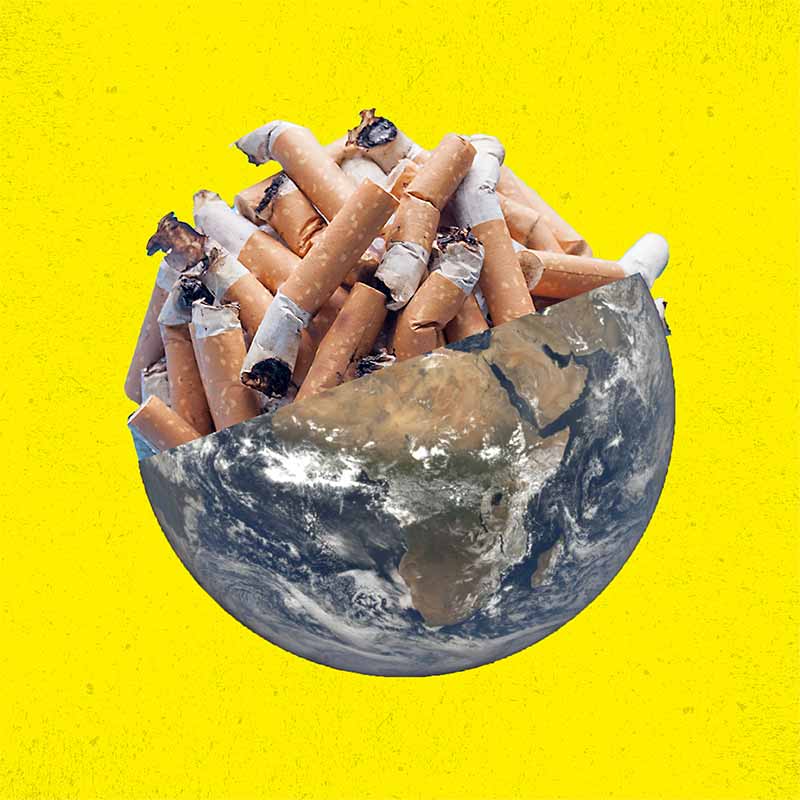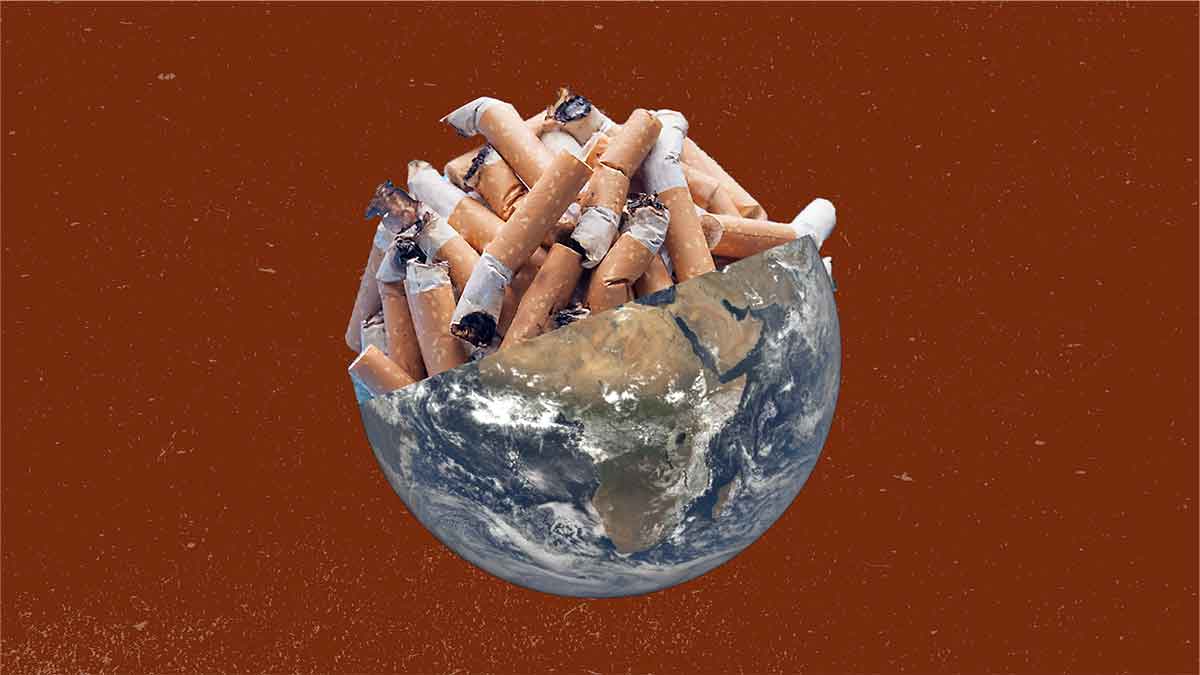- Resources
- News
-
-
Now Accepting Grant Funding Applications
Ready to tackle industry interference? Apply by February 25.
-
Get Email Updates
Sign up for STOP's emails and never miss an update on our latest work and the tobacco industry's activity.
-
Share a Tip
Do you have information on tobacco industry misconduct in your country? Let us know.
-
Now Accepting Grant Funding Applications

The secret’s out: The tobacco industry is one of the world’s worst polluters. A new report by STOP and the World Health Organization (WHO) highlights just how destructive the tobacco industry is to the environment.
Let’s start with the most visible damage: Cigarette butts are the most littered item on the planet—4.5 trillion of them are discarded every year and many end up in waterways, contaminating water and poisoning wildlife. Speaking of water, the industry uses the equivalent of about 8.8 million Olympic-sized swimming pools of it every year for tobacco production, often in countries where water supply is already stressed. And then there’s the damage we can’t see, like the more-than 80 million tonnes of carbon dioxide equivalent emitted into the atmosphere every year to produce some six trillion cigarettes.
The tobacco industry doesn’t want us—consumers, advocates, policymakers—to focus on this. So it “greenwashes” its actions and images, not only to distract from these environmental harms, but to also be perceived (ironically) as environmentally responsible.
The industry does this on a global scale. Recently, a group of experts convened for a webinar hosted by WHO, the Framework Convention on Tobacco Control (FCTC) Secretariat and STOP to discuss the problem and how we can solve it. These important discussions highlight the urgency of shining a light on these efforts and learning how to see past them.
What is greenwashing?
The new report by STOP and WHO cites the Oxford English Dictionary’s definition of greenwashing, which is, “Disinformation disseminated by an organization as to present an environmentally responsible image.” In other words, greenwashing is a tactic used by controversial industries around the world to misleadingly represent their environmentally destructive products and practices as sustainable.
The tobacco industry’s greenwashing efforts have grown in the two decades since they took off in the early 2000s. Today, the industry is leaving no group untargeted, from the general public to policymakers to investors.
What are examples of tobacco industry greenwashing?
The industry’s greenwashing efforts range from advertising feel-good public-facing efforts like beach clean-ups and litter awareness campaigns to promoting potentially misleading environmental, social and governance (ESG) ratings to investors. Here are just a few of the many examples that show the breadth of the industry’s greenwashing attempts.
Public awareness campaigns
Cigarette butts are the most littered item on the planet. Instead of reducing or ceasing production, the industry funds cigarette litter awareness campaigns. For example, several tobacco companies including Reynolds American, owned by British American Tobacco (BAT), and Altria, the parent company of Philip Morris USA, sponsor an initiative called Keep America Beautiful, which runs a Cigarette Litter Prevention Program. This type of greenwashing paints the industry as concerned about litter, while shifting the blame to consumers and the onus of clean-up onto communities.
Sponsorship of government-led environmental efforts
In Brazil, tobacco is one of the top contributors to deforestation, which has reduced the country’s native forest cover to just 2% of its original size. Yet, BAT works with the Ministry of the Environment and other groups on efforts to preserve the forests in southern Brazil. Despite the obvious hypocrisy and conflict of interest, these types of industry-government partnerships can allow tobacco companies access to policymakers, who may be influenced to create policies in favor of the industry’s commercial interests instead of the environment.

This type of greenwashing paints the industry as concerned about litter, while shifting the blame to consumers and the onus of clean-up onto communities.
Promotion of environmental awards
Every year, tobacco companies receive sustainability-focused awards, which they waste no time publicizing. The awards, however, are ironic. For example, British American Tobacco (BAT) Bangladesh has received the “Prime Minister’s Afforestation Award” five times since 1980, despite its industry being a major contributor to deforestation worldwide. Both BAT and Imperial Brands were recognized as being “leaders” in fighting climate change, even though the companies are among the largest in an industry that emits over 80 million tonnes of carbon dioxide equivalent every year and has contributed heavily to global deforestation, a main contributor of carbon dioxide emissions. Tobacco companies can advertise these perplexing awards to gain credibility with the public and decision-makers.
Misleading ESG rankings
All four major transnational tobacco companies (BAT, Philip Morris International, Japan Tobacco International and Imperial Brands) promote their ESG rankings, which helps them be perceived by investors as sustainable. However, these scores may be “perversely” high, as many ranking schemes do not take a company’s actual product or services into account, and because tobacco companies are typically evaluated against each other instead of truly sustainable companies.
Why is greenwashing by the tobacco industry uniquely harmful?
One of the tobacco industry’s key goals is to gain access to policymakers. Attempts to influence policy is a well-documented tactic and evidence suggests this takes place all over the world. Publicizing its greenwashing activities can help tobacco companies gain credibility in the eyes of governments. Participation in sustainability-focused initiatives can also facilitate access to policymakers. The implications of industry influence over policy are serious and can stifle implementation of policies meant to protect people and the environment.
Greenwashing by any industry is deceitful, creating an inaccurate representation of an industry’s impact on the environment. But when carried out by the tobacco industry, it also contravenes the global treaty to reduce tobacco use, the WHO FCTC. Namely, advertising the industry’s “green” efforts goes against the WHO FCTC’s prohibition of tobacco advertising, promotion and sponsorship. Tobacco industry greenwashing can also hinder progress toward promoting economically viable alternatives for tobacco workers and growers, and flouts the treaty’s call for Parties to protect the environment and health related to tobacco growing and manufacturing.
The industry’s “green” PR needs to end
Greenwashing allows the industry to continue with business as usual, including contributing to deforestation, water contamination, air pollution and litter. Calling out and prohibiting the industry’s greenwashing attempts will help the world see the industry for the major polluter that it is.





